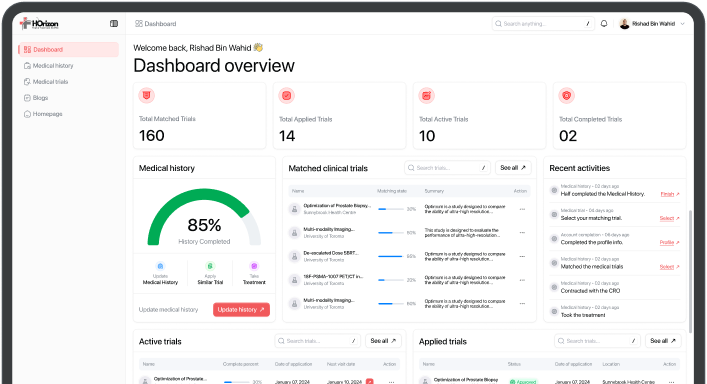If you or someone you care about has been diagnosed with breast cancer, you’ve probably heard about clinical trials. They get talked about as a source of hope, but for many people, they feel like a mystery. What are they? How do you find one? Are they even worth considering?
These questions are completely normal, and the truth is, there’s no one-size-fits-all answer. Clinical trials can provide access to innovative treatments, but finding the right one takes a bit of research, some conversations with your doctor, and knowing what’s most important to you.
Let’s walk through the process together, step by step.
1. What Are Clinical Trials, Really?
You’ve probably heard the term before, but what does a clinical trial actually mean? In simple terms, it’s a study designed to test new ways of treating, diagnosing, or preventing diseases. For breast cancer, that could mean anything from trying out a new medication to testing a combination of therapies to see if they work better together.
Some people explore trials when other treatments haven’t worked, while others look at them as an option early in their care. Either way, a trial could give you access to something promising that isn’t available elsewhere just yet.
2. Take a Moment to Think About Your Needs

Before you start searching for clinical trials, it’s worth pausing to think about what you really want and need. Everyone’s situation is different, so take a few minutes to reflect.
Here are some questions to ask yourself:
- Are you hoping to find a trial because your current treatment isn’t working?
- Do you want to be part of something that helps future patients, even if it doesn’t guarantee results for you?
- Is staying close to home important, or are you okay with traveling for the right trial?
Knowing the answers can help you narrow down your search and focus on what really matters to you.
3. Use Tools to Simplify Your Search

Looking for clinical trials on your own can feel overwhelming. There are so many options out there, and figuring out which ones apply to you can be a challenge.
This is where tools like Horizon Trials can make things easier. Instead of spending hours scrolling through websites or trying to decode complicated medical language, platforms like Horizon match you with trials based on your specific needs and diagnosis.
It’s a faster, simpler way to focus on trials that actually make sense for you.
4. Talk to Your Doctor

Your doctor is one of your biggest allies when it comes to exploring clinical trials. They know your medical history, your current treatment plan, and your goals. They can also help you figure out whether a trial is a good fit.
When you bring up the idea of clinical trials, try asking questions like:
- Are there trials you think I’d qualify for?
- How would a trial fit into my overall treatment plan?
- What should I expect if I decide to apply?
Your doctor can also help with the paperwork and referrals that some trials require, so don’t hesitate to lean on them for support.
5. Get to Know the Details
Once you’ve found a trial that sounds interesting, take some time to really understand what it involves. Every trial is different, so it’s important to ask questions and make sure you’re comfortable with the requirements.
Here are a few things to think about:
- Eligibility: Does the trial match your specific type and stage of breast cancer?
- Location: Is the trial site nearby, or will you need to travel?
- Time Commitment: How often will you need to attend appointments, and for how long?
- Risks and Benefits: What are the potential side effects, and do the benefits outweigh them?
Trial coordinators are there to help answer your questions, so don’t be afraid to reach out for clarification.
6. Start Local, if Possible
Canada is known for its leadership in medical research, and there are many breast cancer clinical trials happening across the country. If you live near a major research center or hospital, there’s a good chance you’ll find opportunities close to home.
Starting your search locally can make things more manageable, especially if regular travel isn’t an option. Platforms like Horizon Trials can connect you to Canadian trials, saving you the hassle of scouring multiple resources.
7. Be Ready to Apply
Applying for a clinical trial usually involves a few steps, but it’s not as complicated as it might sound. Most trials will ask for your medical records, including your treatment history, and may require a referral from your doctor.
It’s also common to attend a pre-screening appointment where the trial team reviews your case to confirm you’re eligible. Having all your paperwork ready can help the process go more smoothly.
8. Keep an Open Mind

Sometimes, the first trial you apply for might not work out. Maybe you don’t meet the eligibility criteria, or the spots are already filled. That’s okay—there are always new trials opening, and the right one for you might be just around the corner.
Horizon Trials, for example, can send you updates when new matches become available, so you don’t have to start your search from scratch every time.
Final Thoughts
Exploring clinical trials might feel like a big step, but it’s one that can open doors to new possibilities. By reflecting on your priorities, seeking support from your doctor, and using tools like Horizon Trials, you can navigate the process with confidence.
Remember, clinical trials aren’t just about finding treatments—they’re about finding hope and playing a role in shaping the future of breast cancer care.
If you’re ready to explore your options, take the first step today. The answers you’re looking for could be closer than you think.

